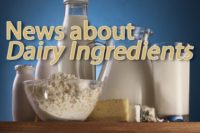Consuming high-protein dairy foods, can help maintain muscle during weight loss

Spreading the word about dairy’s contributions to a healthy weight, and expanding the supporting science is key as obesity continues to be a serious health concern in the United States. Through dairy checkoff-funded research, the dairy industry has made it a priority to address the obesity epidemic and provide scientific insights into dairy’s role in achieving and maintaining a healthy weight. In addition, dairy foods can improve weight loss quality in adults by preserving muscle and bone while losing fat.
Today, more than two-thirds of adults are either overweight or obese — statistics which are alarming. Obesity is associated with the development of several other debilitating health conditions, like type 2 diabetes. If current trends continue, not only will the prevalence of obesity increase, but total health care costs associated with these issues are estimated to double every decade, eventually costing between $860 billion and $957 billion in 2030.
Obesity develops when calories consumed chronically exceed calories burned. A substantial amount of research has focused on ways to correct this energy imbalance. Although calorie restriction can produce favorable body weight changes, there is often loss of lean mass and bone in addition to body fat. Therefore, it is important to identify specific foods or nutrients that can help consumers strategically and successfully manage their weight while enhancing body composition.
Backing it up with science
There is a growing body of science that can be leveraged by dairy marketers to communicate the value of consuming three servings of dairy each day as part of a nutrient-rich, balanced diet. In particular, numerous studies lay a foundation for dairy’s role in helping to maintain a healthy weight and body composition.
Over the past decade, an abundance of scientific data has emerged that supports a beneficial relationship between dairy consumption and body composition and weight in adults. Results from clinical studies examining weight loss have mixed results. Some studies showed no added effect of dairy intake and others showed an improvement in weight or fat loss compared to low dairy intake. It is clear that adequate dairy consumption does not contribute to weight gain and does not inhibit weight loss during calorie restriction. Dairy foods are an integral part of any diet and particularly weight loss programs because of their nutrient contributions.
Preserving muscle and bone
While reducing calories alone can lead to weight loss, such weight loss usually includes both fat and muscle tissue. Muscle helps regulate and maintain glucose and fat metabolism; therefore, the loss of muscle during weight loss may adversely affect metabolic health and make it easier to regain weight.
A study that examined a weight loss diet, which included three daily servings of fat-free yogurt, found that fat loss was markedly increased while muscle loss was reduced by 31% compared to the low dairy control diet. More recent research indicates that diet- and exercise-induced weight loss with higher protein, mainly from increased dairy products, improved weight loss quality by promoting more favorable body composition changes in previously overweight and obese women. In particular, there was greater loss of total and abdominal fat and gains in muscle.
A recent systematic review and meta-analysis associated increased dairy intake with a 1.6 pound greater reduction in fat mass and a 1.3 pound gain in muscle mass. These results indicate that consuming dairy foods can help enhance fat loss while maintaining muscle during weight reduction.
Research demonstrates that weight loss also can adversely affect bone health. The effects of dairy intake on bone health during both development and aging have been extensively studied and are well known. However, relatively little research has examined the impact of dairy on bone health during weight loss.
Recent data indicate that consuming diets higher in protein and rich in dairy foods improves markers of bone health in overweight and obese young women during diet- and exercise-induced weight loss. Additionally, results from a controlled feeding study demonstrated that adequate dairy intake can prevent an increase in bone turnover, thus preventing bone loss, during weight reduction. Taken together, these studies reinforce “that intake of milk and milk products is linked to improved bone health,” as outlined in the “Dietary Guidelines for Americans.”
Advancing the science
Research on the role of dairy foods in improving the quality of weight loss is promising. As science continues to advance, we are gaining a better understanding of how dairy foods can help overweight adults consuming an energy-restricted diet maintain a more optimal body composition. Future research examining the importance of including dairy in a weight loss diet is warranted.
This research is a key priority area of the Dairy Research Institute, an organization established under the leadership of America’s dairy farmers through Dairy Management Inc. DRI works with industry and other partners to drive pre-competitive research in nutrition, products, and sustainability.
For additional information on dairy product and nutrition research, visit USDairy.com.
Looking for a reprint of this article?
From high-res PDFs to custom plaques, order your copy today!





